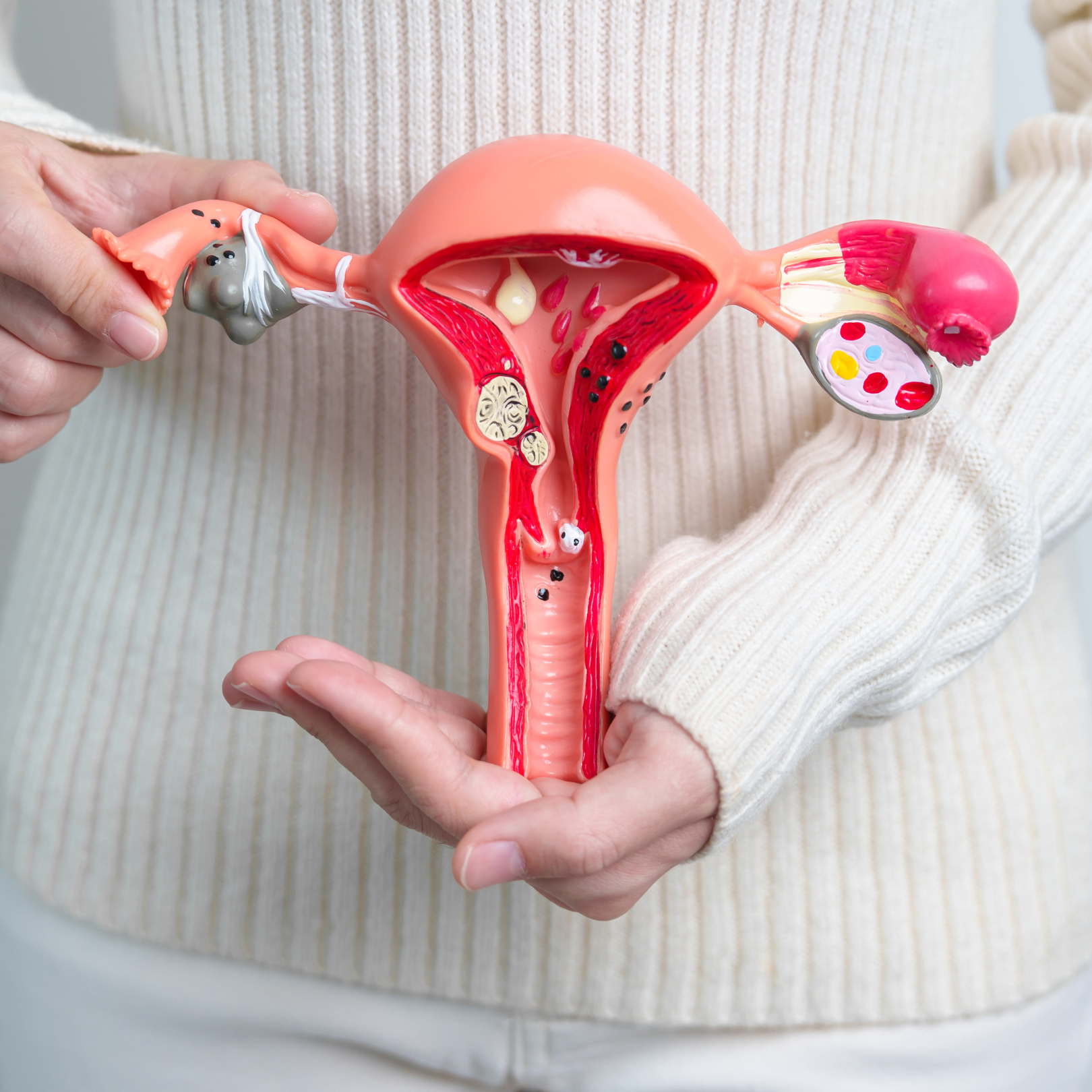
The Real Reason Behind Uterine Fibroids
Do you experience heavy periods that sometimes last longer than seven days? Do you find yourself frequently needing to use the bathroom, only to feel like nothing comes out? If so, you may be dealing with uterine fibroids. They are benign but often troublesome growths that can significantly impact a woman’s health and quality of life.
Understanding the connection between hormonal balance, liver function, gut health, and overall wellbeing is key to managing and even reversing fibroids naturally.
What Are Uterine Fibroids?
Also known as leiomyomas or myomas, uterine fibroids are non-cancerous growths that develop within the muscular wall of the uterus. They can vary in size, shape, and location, with some remaining small and symptom-free while others grow larger and cause significant discomfort. Although fibroids are common, their impact on each woman differs, making personalised treatment essential.
Oestrogen Dominance & Uterine Fibroids
Similar to polycystic ovary syndrome (PCOS), fibroids are closely linked to hormonal imbalances, particularly oestrogen dominance. Elevated oestrogen levels contribute to fibroid growth, especially during pregnancy, when hormonal fluctuations are at their peak. Conversely, as women approach menopause and oestrogen levels decline, fibroids often shrink on their own.
“It’s not just high oestrogen — it’s low progesterone. True hormone balance is about the ratio, not just the levels.”
The term oestrogen dominance is somewhat misleading as it does not necessarily mean oestrogen levels are excessively high but rather that progesterone levels are too low in relation to oestrogen. Many conventional medical approaches fail to consider this delicate balance, focusing solely on oestrogen without recognising the critical role of progesterone.
Why Do Progesterone Levels Drop?
One primary reason for progesterone depletion is chronic stress. Progesterone serves as a precursor to cortisol, the body’s main stress hormone. When stress levels are high whether due to emotional factors (work, relationships, life events) or physical stressors (gut imbalances, toxins, nutrient deficiencies, or heavy metals) the body prioritises cortisol production, leading to a decline in progesterone levels.
As progesterone decreases while oestrogen remains unchanged, symptoms of oestrogen dominance arise, including:
-
Water retention
-
Unexplained weight gain, particularly around the midsection
-
Low libido
-
Mood swings or depression
Small vs Large Fibroids: The Role of Progesterone
While normalising progesterone levels can halt the growth of small fibroids, the relationship between progesterone and large fibroids is more complex. In some cases, progesterone may actually stimulate the growth of larger fibroids. This is why surgical interventions such as myomectomy or hysterectomy may be necessary in severe cases, but only as a last resort when holistic approaches have been exhausted.
Recognising the Symptoms of Fibroids
Not all women with fibroids experience symptoms, but for those who do, common signs include:

-
Heavy periods or clotting during or between menstrual cycles
-
Prolonged periods lasting more than seven days
-
Constipation
-
Pelvic pain or pressure
-
A constant urge to urinate without actual relief
-
Abdominal swelling or bloating
-
Backaches and/or leg pain
If these symptoms sound familiar, a holistic approach that addresses the underlying causes could offer you relief without resorting to invasive procedures.
A Holistic Path to Healing
At Synergised, we advocate for a functional medicine approach that considers all aspects of your health, rather than just suppressing symptoms. By understanding and addressing the root causes of fibroids, you can take control of your health naturally.

1. Supporting Liver Function
Your liver plays a vital role in detoxification, particularly in eliminating excess oestrogen from your system. If your liver is overburdened with toxins from processed foods, environmental pollutants, and endocrine disruptors, it may struggle to clear oestrogen efficiently, leading to hormonal imbalances and fibroid growth.
To optimise liver function:
-
Incorporate cruciferous vegetables (broccoli, cauliflower, kale) rich in indole-3-carbinol, which supports oestrogen metabolism.
-
Reduce alcohol and caffeine intake to lessen liver strain.
-
Consider a structured detox programme, such as the 21-Day Reset, to enhance detoxification pathways.
2. Restoring Gut Health
Your gut microbiome directly influences hormonal balance. If your gut is imbalanced (a condition known as intestinal dysbiosis), it can lead to the reabsorption of excess oestrogen rather than its excretion, exacerbating fibroid growth.
To restore gut balance:
-
Eat a fibre-rich diet to support healthy digestion and oestrogen elimination.
-
Include fermented foods (sauerkraut, kimchi, kefir) to replenish beneficial gut bacteria.
-
Avoid processed sugars and refined carbs, which fuel inflammation and dysbiosis.
3. Managing Stress & Balancing Cortisol
Since stress depletes progesterone, managing stress effectively is crucial for rebalancing hormones. Practical steps include:
-
Prioritising sleep to support adrenal health.
-
Engaging in mindfulness practices such as meditation, breathwork, or gentle yoga, now available on the Synergised App.
-
Avoiding stimulants that increase cortisol production, such as excessive caffeine.
-
Incorporating adaptogenic herbs like ashwagandha and rhodiola, which help modulate stress response.
4. Reducing Environmental Toxins
Endocrine disruptors found in plastics, cosmetics, and cleaning products can mimic oestrogen and contribute to hormonal imbalances. To minimise exposure:
-
Use glass or stainless steel containers instead of plastic.
-
Switch to natural, non-toxic personal care products.
-
Filter your water to remove potential contaminants.
Final Thoughts
Uterine fibroids do not have to dictate your life. By addressing the root causes including hormonal imbalances, liver function, gut health, and stress levels you can support your body in healing naturally. While medical interventions may be necessary in extreme cases, many women find relief through targeted dietary, lifestyle, and supplementation strategies.
If you're ready to take the first step, consider beginning with a liver detox through the 21-Day Reset. By supporting the foundational aspect of health, you create the ideal conditions for hormonal balance and overall wellbeing.

Follow Our Instagram For Exclusive Content





 د.إ / AED
د.إ / AED



Leave a comment